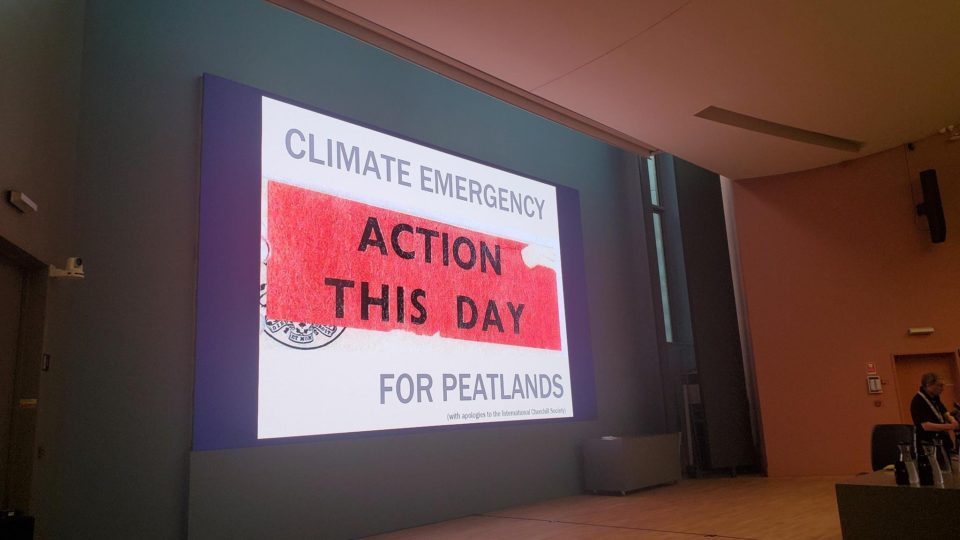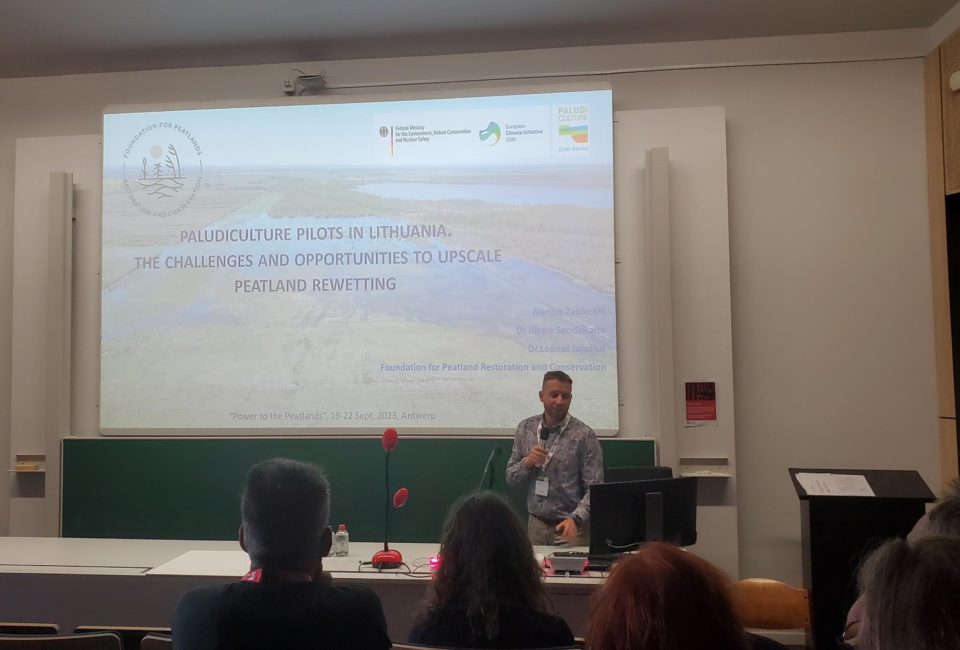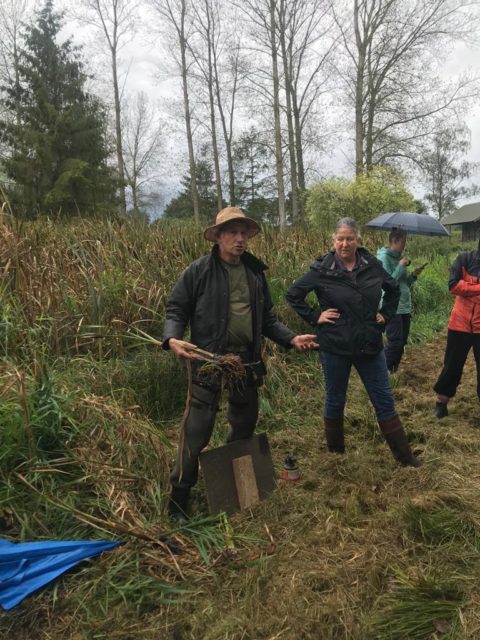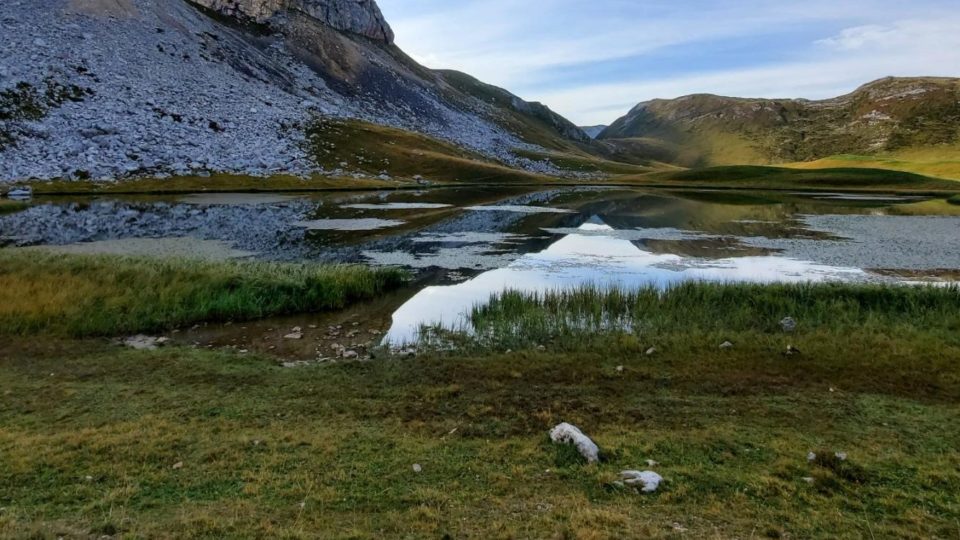Last week, the Power to the Peatlands conference in Antwerp, called for urgent joint action for nature, climate, and the future. Participants stressed the need to bring people together towards solutions to peatland degradation. Rewetting peatlands will ensure more sustainable livelihoods and address the decline of biodiversity and climate change.
 Richard Lindsay used the metaphor of the Churchill “Action this Day” stickers to urge action on extreme priorities for peatlands. Photo: Elise Vitali
Richard Lindsay used the metaphor of the Churchill “Action this Day” stickers to urge action on extreme priorities for peatlands. Photo: Elise Vitali
Europe’s largest gathering of peatland experts took place in Antwerp with the “Power to the Peatlands” Conference from 19 to 21 September 2023, bringing together more than 550 people in person and online, including peatlands scientists, land managers and civil society representatives from Europe and beyond.
The Interreg North-West Europe Care-Peat project, the University of Antwerp, Natuurpunt, Eurosite, and several partner organizations, including Wetlands International, co-organised the conference.
The event celebrated peatlands and the services they provide to people. The objective was to raise the profile of peatlands as a valuable ecosystem, able to contribute to the EU’s nature and climate policy objectives. Peatlands provide numerous ecosystem services, such as habitats for rare species, protecting and filtering water supplies, mitigating climate change, helping to avoid disasters such as floods, and much more. As more than 50% of Europe’s peatlands are degraded, participants stressed the importance of conserving and restoring peatlands, working together with farmers, foresters, land-owners and scientists.
“Healthy wet peatlands are biodiversity havens that curb carbon dioxide emissions, mitigate flood, drought and fire risks and improve water quality. They play an indispensable role in tackling climate change and maintaining a healthy and safe environment for people. The Conference shows that whilst there is still much to be learned about our European peatlands we know enough to act now. It is urgent that we mobilise communities, including farmers, foresters, policymakers, investors, scientists and activists, to conserve, restore and sustainably manage peatlands” said Chris Baker, Director of Wetlands International Europe.
To this end, the conference adopted a declaration calling for urgent joint action from land users, land owners, decision makers, NGOs, scientists and entrepreneurs.
Participants gave inspiring keynote speeches, including an opening address by Hans Joosten, Professor of Peatland Studies and Palaeoecology, University of Greifswald, with reflections on the history of peatlands and humankind. Richard Lindsay, Principal Lecturer in Ecology, Conservation and Environmental Sustainability at the University of East London, provided reflections on why education and communication about peatlands is essential: “The very thing that makes a peatland a peatland is not visible. If you are not aware of something’s presence, how can you attach value to it?” Other speakers also expressed similar considerations and values delving into key findings from assessments on European peatlands, policy developments impacting peatlands and their benefits for society. An address by the environment services of the European Commission aimed at reassuring the audience about the institution’s willingness to act to safeguard peatlands at EU level.
The lectures and workshops provided a platform to showcase the latest achievements and challenges related to peatland science and politics. Conference participants discussed peatland conservation and practical challenges in restoring peatlands, but also various solutions. Participants showed promising developments, from blended finance to securing a just transition and livelihood for people working on peatlands.
Paludiculture, farming on wet peatlands, was an important topic at the conference. At the PaludiFair exhibition, participants showed products made from reed and sphagnum mosses, which can be grown on wet peatlands, and shared insights into their production and potential uses. This also included a presentation of furniture and boards created by the start-up “Moor and more” using materials grown on rewetted peatlands. On the last day of the conference, participants could visit a site where paludiculture is being put into practice.
However, as participants heard, there are a number of challenges in implementing paludiculture on a large scale, including the acceptance and willingness of farmers, who face a number of constraints. “Effective rewetting cannot be achieved without the people who work and live in the peatlands”, said Amelie Hünnebeck-Wells,, who has conducted research into sustainable management of peatlands at Leuphana University Lüneberg.
 Nerijus Zableckis, director of the Foundation for Peatlands Restoration and Conservation, talks about paludiculture challenges and opportunities in Lithuanian pilot sites. Photo: Elise Vitali
Nerijus Zableckis, director of the Foundation for Peatlands Restoration and Conservation, talks about paludiculture challenges and opportunities in Lithuanian pilot sites. Photo: Elise Vitali
The EU and Member States need to set the necessary incentives for a cultural shift away from drainage-based and intensive agriculture. In this way, the path can be cleared for a market that takes up products generated from paludiculture and enables farmers to earn a sustainable and stable income.
These examples showed that pealands can be used more sustainably and that there are alternatives to drainage. Politicians can support these alternatives by creating conditions that encourage people to pursue paludiculture activities, including allocating funding.
For those present, the large turnout was a sign that their work, some of which has been going on for decades, is paying off. The attention for the protection of peatlands is increasing and there are more and more people fighting for this goal. This is also emphasised by Diana Kopansky: “It’s good to hear the words “Power to the Peatlands”. They are extremely powerful, if we protect them!”

Aldert van Weeren, Natural Sponges Coordinator at Wetlands International Europe, shows boards made out of reed at a paludiculture site in the Netherlands. Photo: Jonas Schriefer
Conference_declaration_Power-to-the-Peatlands_09.2023.pdf

